被动语态
图片预览

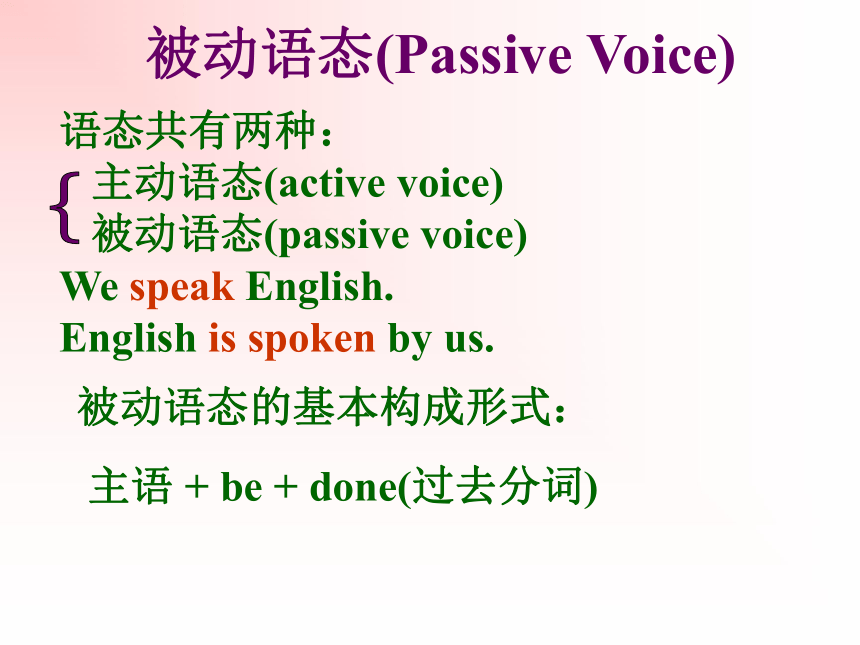
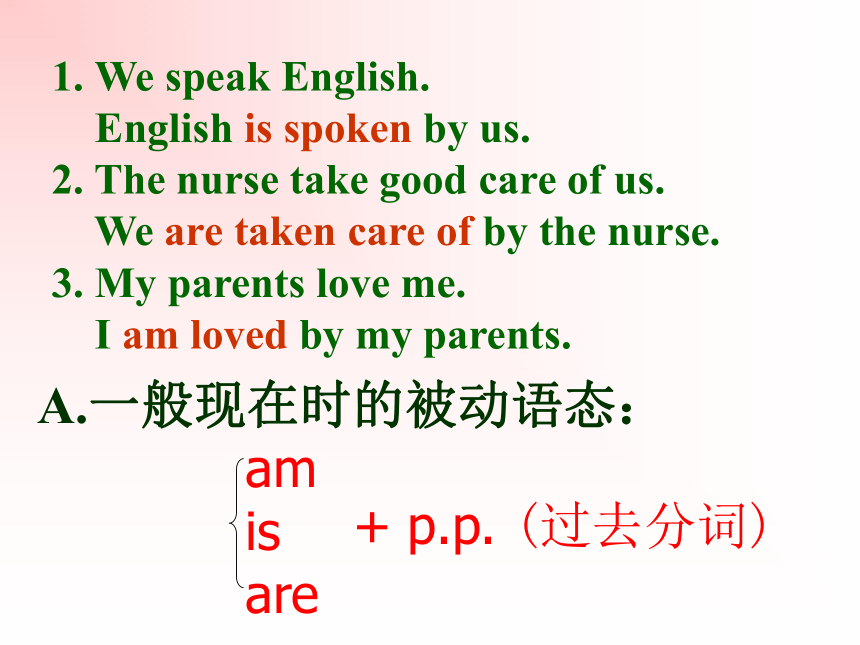
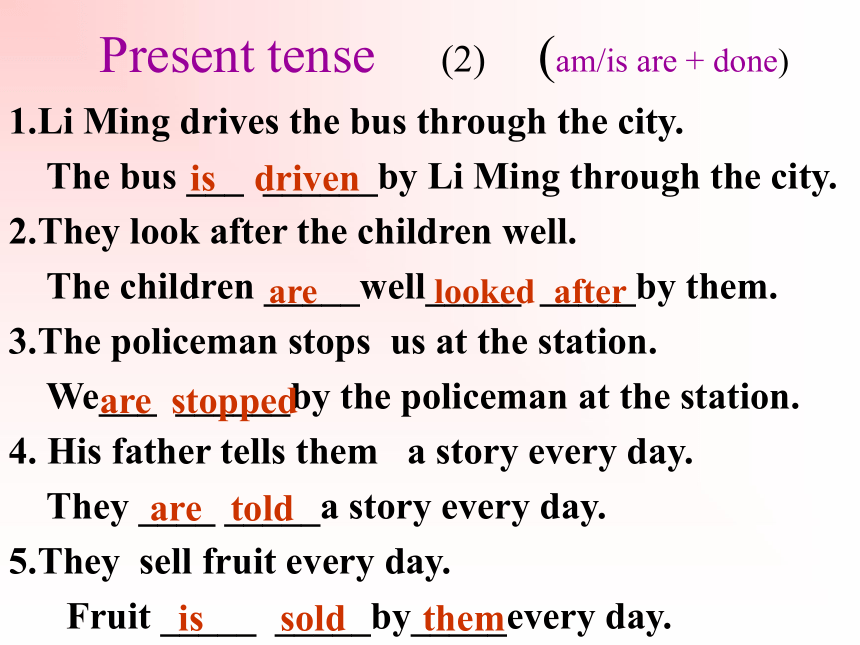
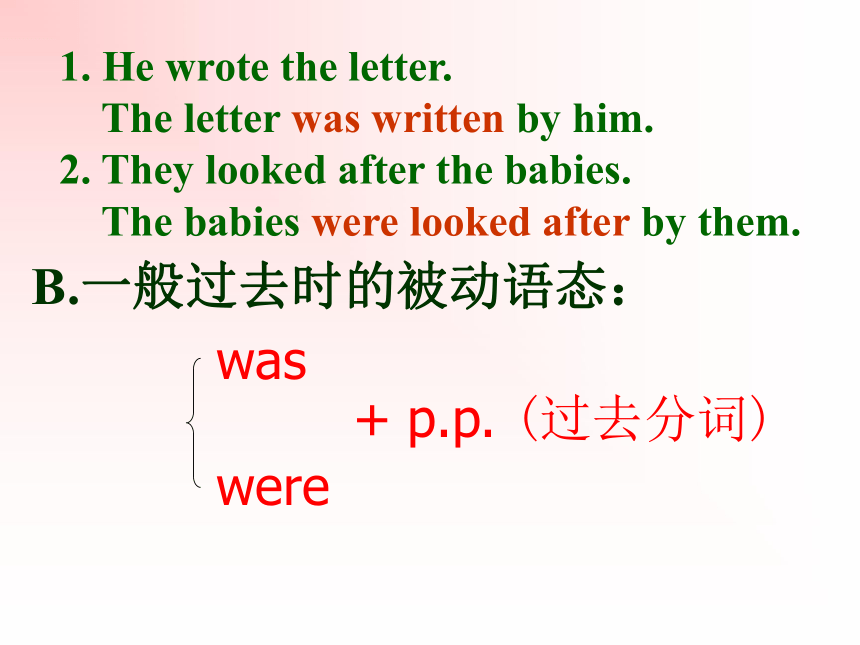
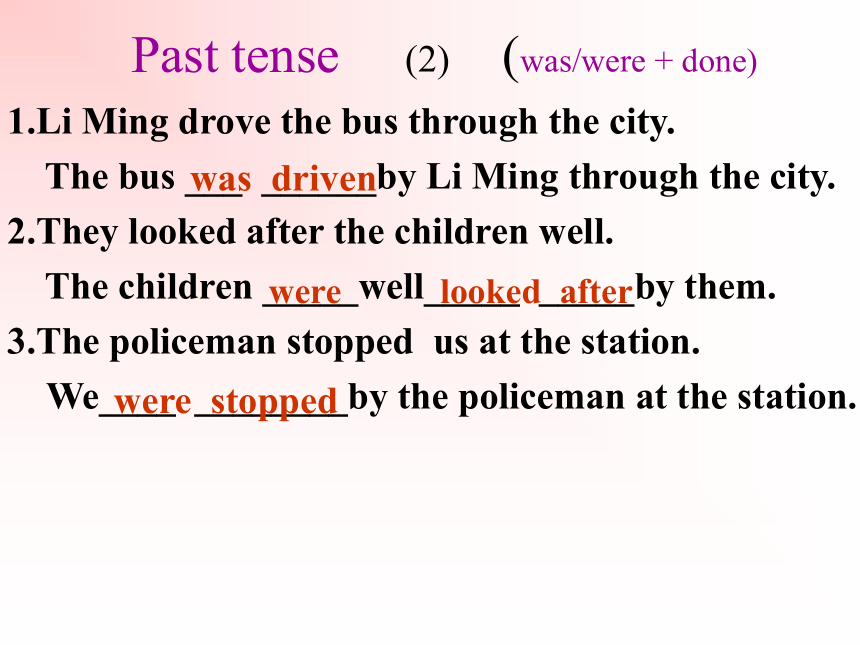
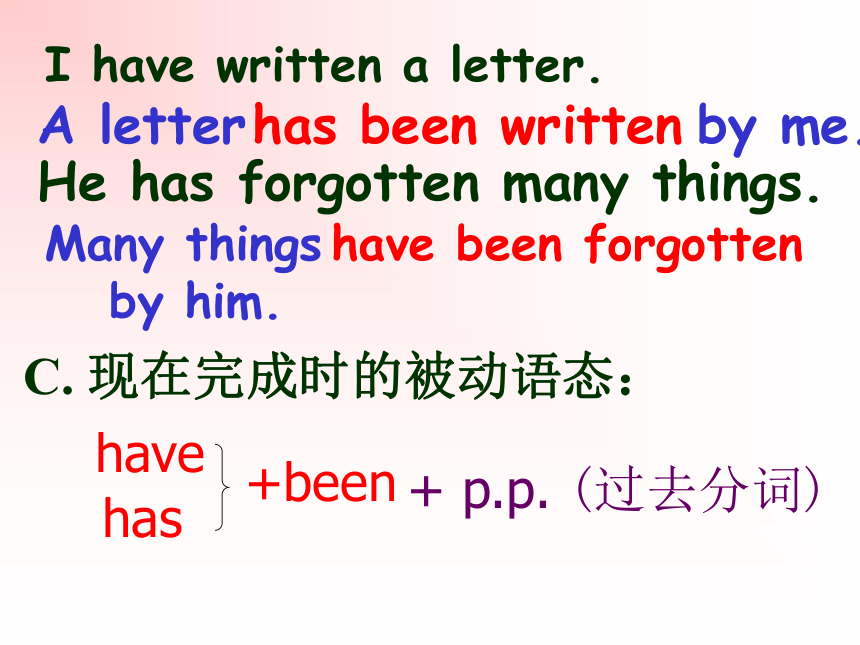
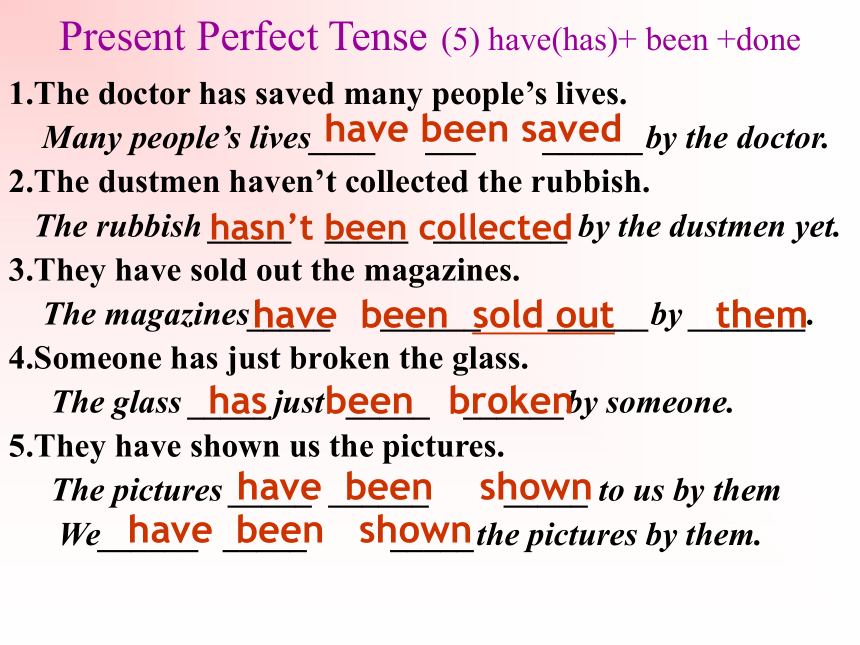
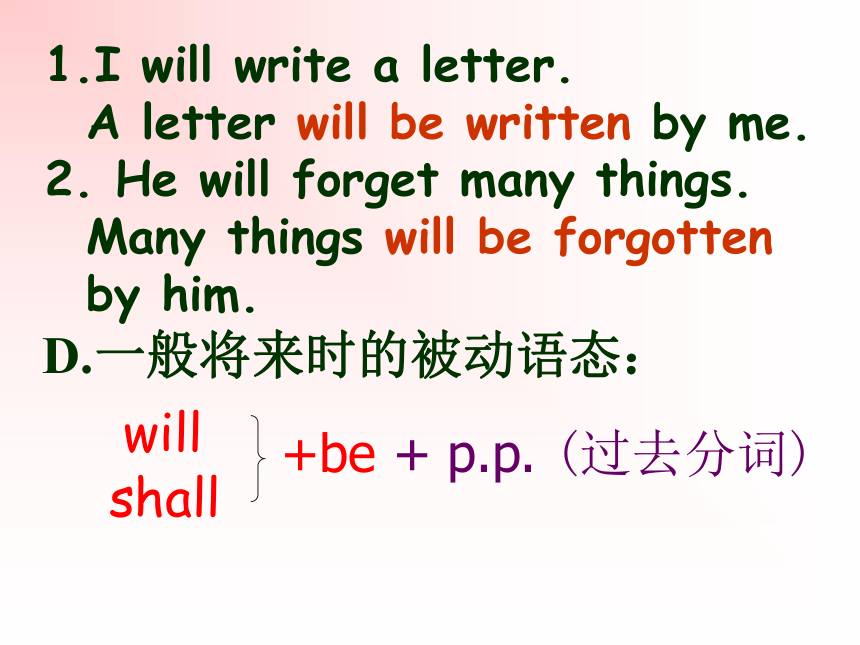
文档简介
课件28张PPT。被动语态(Passive Voice)
被动语态(Passive Voice)语态共有两种:
主动语态(active voice)
被动语态(passive voice)
We speak English.
English is spoken by us. 被动语态的基本构成形式:主语 + be + done(过去分词){We speak English.
English is spoken by us.
2. The nurse take good care of us.
We are taken care of by the nurse.
3. My parents love me.
I am loved by my parents.
A.一般现在时的被动语态:am
is
are+ p.p. (过去分词)Present tense (2) (am/is are + done)1.Li Ming drives the bus through the city.
The bus ___ ______by Li Ming through the city.
2.They look after the children well.
The children _____well_____ _____by them.
3.The policeman stops us at the station.
We___ ______by the policeman at the station.
4. His father tells them a story every day.
They ____ _____a story every day.
5.They sell fruit every day.
Fruit _____ _____by_____every day.
is driven are looked after are stopped are told is sold themHe wrote the letter.
The letter was written by him.
2. They looked after the babies.
The babies were looked after by them. B.一般过去时的被动语态:was
were+ p.p. (过去分词)Past tense (2) (was/were + done)1.Li Ming drove the bus through the city.
The bus ___ ______by Li Ming through the city.
2.They looked after the children well.
The children _____well_____ _____by them.
3.The policeman stopped us at the station.
We____ ________by the policeman at the station. was driven were looked after were stoppedI have written a letter.A letterhas been writtenby me.He has forgotten many things.Many things have been forgottenby him.C. 现在完成时的被动语态:havehas+been+ p.p. (过去分词)Present Perfect Tense (5) have(has)+ been +done1.The doctor has saved many people’s lives.
Many people’s lives____ ___ ______by the doctor.
2.The dustmen haven’t collected the rubbish.
The rubbish _____ _____ ________ by the dustmen yet.
3.They have sold out the magazines.
The magazines_____ ______ ______by _______.
4.Someone has just broken the glass.
The glass _____just _____ ______by someone.
5.They have shown us the pictures.
The pictures _____ ______ _____ to us by them
We______ _____ _____the pictures by them.
have been savedhasn’t been collectedhave been sold out them has been broken have been shown have been shownI will write a letter.
A letter will be written by me.
2. He will forget many things.
Many things will be forgotten
by him.D.一般将来时的被动语态:willshall+be+ p.p. (过去分词)I can write a letter.
A letter can be written by me.
2. He must forget the past.
The past must be forgotten by him.E. 情态动词的被动语态:can mustmay+be+ p.p. (过去分词)Exercises for Passive Voice(7)1.You must return the books to him at once.
The books____ __ _____to him at once.
2.He can finish the work in two days.
The work ___ _ ____ by___in two days.
3.We should clean the machine every day.
The machine ____ ____ _____every day.
4.They may fix the car in three days.
The car____ __ ____by __in three days.
5.She will buy another bike soon.
Another bike ___ _ ____by___soon.
must be returned can be finished him should be cleaned may be fixed them will be bought her2. She is painting a picture.
A picture is being painted by her.3. They are repairing the desks.
The desks are being repaired by
them.F. 现在进行时的被动语态--am
is
are+ being+ p.p. (过去分词)He is laughing at me.
I am being laughed at by him.I was writing a letter.
A letter was being written by me.
2. He was repairing the desks.
The desks were being repaired
by him.G. 过去进行时的被动语态--waswere+ being+ p.p. (过去分词)Sentence structure: be + done(pp.)1.(一般现在时被动式)am/is/are +done
2.(一般过去时被动式)was /were + done
3.(完成时被动式)have/has/had +been +done
4.(一般将来时被动式)shall/will/would/+be +done
5.(情态被动式)can/could/may/might/must/
should/need…+be+ done
6.(现在进行时被动式) am/is/are/+being+done
7.(过去进行时被动式) was/were+being+ done
主动语态变为被动语态的特殊情况
有些动词在主动结构中,后面接不带to的不定式,但
如果改成被动句,则需把省略的to加上,这类动词
有:hear, see, watch, make, help, let等。
1) I heard him sing last night.
He was heard to sing last night.
2) We saw him walk into the building.
He was seen to walk into the building.
3) The boss made them work 10 hours a day.
They were made to work 10 hours a day.
4) They watch the children sing that morning.
The children were watched to sing that
morning.Non-verbs(12)1.He saw her work in the office.
She ___ ____ ___ ____ in the office.
2.She watches Ken work hard on the model.
Ken ___ ____ ____ _____hard on the model.
3.We heard him sing in the room.
He _____ ____ ____ ______ in the room by us.
4.I felt someone coming up to me.
Someone _____ _____ ____ up to me.
5.The doctor asked her to take the medicine in time.
She was ____ ____ ____the medicine in time.
was seen to work主动语态变为被动语态的特殊情况
2.
1) Someone gave the boy an apple.
(间接宾语) (直接宾语)
An apple was given (to) the boy.
The boy was given an apple.
2) His father bought him a present.
A present was bought for him.
He was bought a present.show sth to sb / show sb sth
sth is shown to sb.
sb is shown sth
2. give sth to sb / give sb sth
sth is given to sb
sb is gvien sth
3. bring sth to sb / bring sb sth
sth is brought to sb
sb is brought sth4. buy sth for sb / buy sb sth
sth is bought for sb
sb is bought sth
5. make sth for sb / make sb sth
sth is made for sb
Double Objects (11)1.He has given us some advice.
We ____ ____ _____some advice.
Some advice ____ ____ ___to us by him.
2.She taught us the song.
We ______ _____ the song by ______.
The song___ ___ ____ ___ by her.
3.He showed me his stamps.
I _____ _____ his stamps by him.
His stamps ____ ______
____ _____by him.have been givenhas been givenwere taughtherwas taught to uswas shownwere shownto me(11)4.He’d never write her a letter.
She would never ___ _____ a letter by him.
A letter would never ___ _____ ___ ____
by him.
5.He bought me a book yesterday,
I ____ _______a book by him yesterday.
A book ____ ____ ____ ____
by him yesterday.
be writtenbe written to herwas boughtwas bought for me主动形式表被动意义
The pen writes well.
这钢笔很好写。
These shoes wear well.
这鞋子很好穿。
This kind of cloth washes very well.
这种布料很耐洗。
The car drives well.
这车很好开。主动形式表被动意义
2. 某些感官动词也含有被动意义。
如:look, smell, taste, sound
The flowers smell very sweet.
The fish tastes good.
The idea sounds good.
3. 某些动词(词组)中,用-ing形式作宾语,
表示被动含义.如need, be worth,require
The radio needs repairing/to be repaired.
The Great Wall is worth seeing.Future tense with “be going to”be going to+ be+ done (10)1.He is going to write down the story.
The story is going to ___ ____ down by ___.
2.They are going to build the bridge.
The bridge is going to ___ ______ by them.
3.She was going to read the book.
The book was going to _____ _______ by ___
4.His brother is going to speak English in class.
English is going to ___ ______ by him in class.
5.You are going to answer the phone from SH.
The phone from Shanghai is going to
___ ____ by you.General questions (13)1.Did you clean the classroom?
____ the classroom ______by you?
2.Does she often do homework at home?
______homework often_______by her at home?
3.Have you driven your car here?
________ your car ____ _______by you here?
4.Has she seen the film?
_____the the film ____ _______by her?
5.Shall I eat the apple?
______ the apple _____ ______by me?
General questions (14)6.Will they put up their hands?
_____ their hands____ _____up by them?
7.Must she send the letter?
____the letter _____ ______by her?
8.Would they repair the bike ?
______the bike ____ ______by them?
9.Does your mother let you play the piano
____you ___ __ ______the piano
by your mother?
10.Do they make him study hard?
_____he ____ __ ______ hard by them?
Revision of Passive Voice(1)1.The workers will build a bridge over the river.
A bridge _____ ___ ______over the river.
2.You must take care of the children.
The children ____ ____ _____ ____ _____.
3.The doctors can save the girl.
The girl ____ ____ ____by the doctor.
4.They told a lot of people about the news.
A lot of people ____ ______ about the news.
5.The scientists have invented some machines.
Some machines ____ _____ _____
by the scientists.Revision of Passive Voice(2)6.The cleaner cleans the toilets once a day.
The toilets______ _______once a day.
7.We’ll show another new film this evening.
Another new film ____ ____ _____
this evening.
8.He saw her work in the office.
She ____ _____ ___ _____ in the office.
9.She can finish the work in an hour.
The work ___ __ _____ _in an hour.
10.The doctor asked her to lie in bed
for some days.
She ____ ______ ____ ______in bed
for some time.
主动语态(active voice)
被动语态(passive voice)
We speak English.
English is spoken by us. 被动语态的基本构成形式:主语 + be + done(过去分词){We speak English.
English is spoken by us.
2. The nurse take good care of us.
We are taken care of by the nurse.
3. My parents love me.
I am loved by my parents.
A.一般现在时的被动语态:am
is
are+ p.p. (过去分词)Present tense (2) (am/is are + done)1.Li Ming drives the bus through the city.
The bus ___ ______by Li Ming through the city.
2.They look after the children well.
The children _____well_____ _____by them.
3.The policeman stops us at the station.
We___ ______by the policeman at the station.
4. His father tells them a story every day.
They ____ _____a story every day.
5.They sell fruit every day.
Fruit _____ _____by_____every day.
is driven are looked after are stopped are told is sold themHe wrote the letter.
The letter was written by him.
2. They looked after the babies.
The babies were looked after by them. B.一般过去时的被动语态:was
were+ p.p. (过去分词)Past tense (2) (was/were + done)1.Li Ming drove the bus through the city.
The bus ___ ______by Li Ming through the city.
2.They looked after the children well.
The children _____well_____ _____by them.
3.The policeman stopped us at the station.
We____ ________by the policeman at the station. was driven were looked after were stoppedI have written a letter.A letterhas been writtenby me.He has forgotten many things.Many things have been forgottenby him.C. 现在完成时的被动语态:havehas+been+ p.p. (过去分词)Present Perfect Tense (5) have(has)+ been +done1.The doctor has saved many people’s lives.
Many people’s lives____ ___ ______by the doctor.
2.The dustmen haven’t collected the rubbish.
The rubbish _____ _____ ________ by the dustmen yet.
3.They have sold out the magazines.
The magazines_____ ______ ______by _______.
4.Someone has just broken the glass.
The glass _____just _____ ______by someone.
5.They have shown us the pictures.
The pictures _____ ______ _____ to us by them
We______ _____ _____the pictures by them.
have been savedhasn’t been collectedhave been sold out them has been broken have been shown have been shownI will write a letter.
A letter will be written by me.
2. He will forget many things.
Many things will be forgotten
by him.D.一般将来时的被动语态:willshall+be+ p.p. (过去分词)I can write a letter.
A letter can be written by me.
2. He must forget the past.
The past must be forgotten by him.E. 情态动词的被动语态:can mustmay+be+ p.p. (过去分词)Exercises for Passive Voice(7)1.You must return the books to him at once.
The books____ __ _____to him at once.
2.He can finish the work in two days.
The work ___ _ ____ by___in two days.
3.We should clean the machine every day.
The machine ____ ____ _____every day.
4.They may fix the car in three days.
The car____ __ ____by __in three days.
5.She will buy another bike soon.
Another bike ___ _ ____by___soon.
must be returned can be finished him should be cleaned may be fixed them will be bought her2. She is painting a picture.
A picture is being painted by her.3. They are repairing the desks.
The desks are being repaired by
them.F. 现在进行时的被动语态--am
is
are+ being+ p.p. (过去分词)He is laughing at me.
I am being laughed at by him.I was writing a letter.
A letter was being written by me.
2. He was repairing the desks.
The desks were being repaired
by him.G. 过去进行时的被动语态--waswere+ being+ p.p. (过去分词)Sentence structure: be + done(pp.)1.(一般现在时被动式)am/is/are +done
2.(一般过去时被动式)was /were + done
3.(完成时被动式)have/has/had +been +done
4.(一般将来时被动式)shall/will/would/+be +done
5.(情态被动式)can/could/may/might/must/
should/need…+be+ done
6.(现在进行时被动式) am/is/are/+being+done
7.(过去进行时被动式) was/were+being+ done
主动语态变为被动语态的特殊情况
有些动词在主动结构中,后面接不带to的不定式,但
如果改成被动句,则需把省略的to加上,这类动词
有:hear, see, watch, make, help, let等。
1) I heard him sing last night.
He was heard to sing last night.
2) We saw him walk into the building.
He was seen to walk into the building.
3) The boss made them work 10 hours a day.
They were made to work 10 hours a day.
4) They watch the children sing that morning.
The children were watched to sing that
morning.Non-verbs(12)1.He saw her work in the office.
She ___ ____ ___ ____ in the office.
2.She watches Ken work hard on the model.
Ken ___ ____ ____ _____hard on the model.
3.We heard him sing in the room.
He _____ ____ ____ ______ in the room by us.
4.I felt someone coming up to me.
Someone _____ _____ ____ up to me.
5.The doctor asked her to take the medicine in time.
She was ____ ____ ____the medicine in time.
was seen to work主动语态变为被动语态的特殊情况
2.
1) Someone gave the boy an apple.
(间接宾语) (直接宾语)
An apple was given (to) the boy.
The boy was given an apple.
2) His father bought him a present.
A present was bought for him.
He was bought a present.show sth to sb / show sb sth
sth is shown to sb.
sb is shown sth
2. give sth to sb / give sb sth
sth is given to sb
sb is gvien sth
3. bring sth to sb / bring sb sth
sth is brought to sb
sb is brought sth4. buy sth for sb / buy sb sth
sth is bought for sb
sb is bought sth
5. make sth for sb / make sb sth
sth is made for sb
Double Objects (11)1.He has given us some advice.
We ____ ____ _____some advice.
Some advice ____ ____ ___to us by him.
2.She taught us the song.
We ______ _____ the song by ______.
The song___ ___ ____ ___ by her.
3.He showed me his stamps.
I _____ _____ his stamps by him.
His stamps ____ ______
____ _____by him.have been givenhas been givenwere taughtherwas taught to uswas shownwere shownto me(11)4.He’d never write her a letter.
She would never ___ _____ a letter by him.
A letter would never ___ _____ ___ ____
by him.
5.He bought me a book yesterday,
I ____ _______a book by him yesterday.
A book ____ ____ ____ ____
by him yesterday.
be writtenbe written to herwas boughtwas bought for me主动形式表被动意义
The pen writes well.
这钢笔很好写。
These shoes wear well.
这鞋子很好穿。
This kind of cloth washes very well.
这种布料很耐洗。
The car drives well.
这车很好开。主动形式表被动意义
2. 某些感官动词也含有被动意义。
如:look, smell, taste, sound
The flowers smell very sweet.
The fish tastes good.
The idea sounds good.
3. 某些动词(词组)中,用-ing形式作宾语,
表示被动含义.如need, be worth,require
The radio needs repairing/to be repaired.
The Great Wall is worth seeing.Future tense with “be going to”be going to+ be+ done (10)1.He is going to write down the story.
The story is going to ___ ____ down by ___.
2.They are going to build the bridge.
The bridge is going to ___ ______ by them.
3.She was going to read the book.
The book was going to _____ _______ by ___
4.His brother is going to speak English in class.
English is going to ___ ______ by him in class.
5.You are going to answer the phone from SH.
The phone from Shanghai is going to
___ ____ by you.General questions (13)1.Did you clean the classroom?
____ the classroom ______by you?
2.Does she often do homework at home?
______homework often_______by her at home?
3.Have you driven your car here?
________ your car ____ _______by you here?
4.Has she seen the film?
_____the the film ____ _______by her?
5.Shall I eat the apple?
______ the apple _____ ______by me?
General questions (14)6.Will they put up their hands?
_____ their hands____ _____up by them?
7.Must she send the letter?
____the letter _____ ______by her?
8.Would they repair the bike ?
______the bike ____ ______by them?
9.Does your mother let you play the piano
____you ___ __ ______the piano
by your mother?
10.Do they make him study hard?
_____he ____ __ ______ hard by them?
Revision of Passive Voice(1)1.The workers will build a bridge over the river.
A bridge _____ ___ ______over the river.
2.You must take care of the children.
The children ____ ____ _____ ____ _____.
3.The doctors can save the girl.
The girl ____ ____ ____by the doctor.
4.They told a lot of people about the news.
A lot of people ____ ______ about the news.
5.The scientists have invented some machines.
Some machines ____ _____ _____
by the scientists.Revision of Passive Voice(2)6.The cleaner cleans the toilets once a day.
The toilets______ _______once a day.
7.We’ll show another new film this evening.
Another new film ____ ____ _____
this evening.
8.He saw her work in the office.
She ____ _____ ___ _____ in the office.
9.She can finish the work in an hour.
The work ___ __ _____ _in an hour.
10.The doctor asked her to lie in bed
for some days.
She ____ ______ ____ ______in bed
for some time.
同课章节目录
- 词法
- 名词
- 动词和动词短语
- 动词语态
- 动词时态
- 助动词和情态动词
- 非谓语动词
- 冠词
- 代词
- 数词和量词
- 形容词副词及其比较等级
- 介词和介词短语
- 连词和感叹词
- 构词法
- 相似、相近词比较
- 句法
- 陈述句
- 一般疑问句和否定疑问句
- 特殊疑问句及选择疑问句
- 反意疑问句
- 存在句(There be句型)
- 宾语从句
- 定语从句
- 状语从句
- 主谓一致问题
- 简单句
- 并列句
- 复合句
- 主谓一致
- 主、表语从句
- 名词性从句
- 直接引语和间接引语
- 虚拟语气
- 感叹句
- 强调句
- 倒装句
- 祈使句
- 句子的成分
- 句子的分类
- 题型专区
- 单项选择部分
- 易错题
- 完形填空
- 阅读理解
- 词汇练习
- 听说训练
- 句型转换
- 补全对话
- 短文改错
- 翻译
- 书面表达
- 任务型阅读
- 语法填空
- 其他资料
